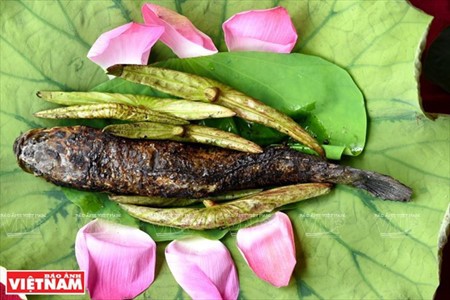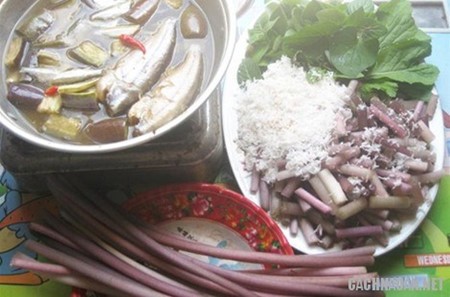(VOVworld)- The gastronomy of the south and the Plain of Reeds in particular was created and enriched during the centuries-old history of the region. The dishes are simple but reflect the local lifestyle.
The Plain of Reeds is blessed with diverse flora and fauna. Because it’s a submerged region, the Plain of Reeds has an abundance of fish and the locals are masters in cooking fish dishes. Pham Van Tran is a culture and tourism researcher in Dong Thap province: “The Plain of Reeds is a basin. Local cuisines embrace specificities of a wild land. They are natural while the cooking technique is less important than the diversity of local ingredients”.
 |
With abundant fish, local chefs have created a variety of fish dishes including grilled, steamed, and boiled fish, and fish sauce. Bamboo-stick-grilled fish is the most popular. After being cleaned, fish are fixed on bamboo sticks with one end planted in the ground and then grilled over rice straw. After 5 to 7 minutes, grilled fish are ready to be served with salt or tamarind fish sauce. Linh fish is a local specialty. The fish is only available in the monsoon season. It can be prepared in various ways. Tu Be is a local fisherman: “Al old expression is “cheap as Linh fish”, but that is no longer the case today. The price can reach 200,000 dongs per kilo. They are marinated with peanuts, salted fish or vinegar, or a sour-sweet broth is prepared with them. "
 |
Mr. Tu Be says Linh fish cooked with Dien Dien or water lily flowers are the most popular and are only available during the monsoon season. Mam kho is another specialty of the Plain of Reeds. It is a mixture of eels, rice crabs and wild vegetables.
The culinary culture of the Plain of Reeds expresses the creativity and open-mindedness of its inhabitants, without too much dependence on the culinary technique or the abundance of local products. Researcher Pham Van Tran adds: "The cuisine of Dông Thap Muoi testifies to the efforts of our ancestors during the early days of clearing the rich lands of the South. They came from other parts of the country bringing along their cultural traditions. We must preserve and enhance this gastronomic heritage of the Plain of Reeds in order to promote culture and tourism and protect the biodiversity of the local ecosystem. "